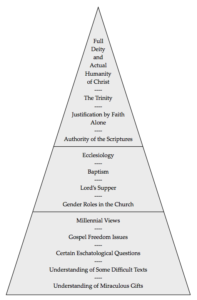Jesus said a lot of countercultural things when he walked on this earth, but near the top of that list has to be when he told his followers to “love their enemies.” It’s hard enough to just love our neighbor—which is something else that Jesus told us to do—but to love our enemies—for many of us, that’s just a bridge too far. Why should I love my enemies?
Many people will recall that in 2012 the whole idea of same-sex marriage was in the media almost every day. It’d be another three-years before the Supreme Court would make same-sex marriage the law of the land, but in 2012 the movement was already gaining widespread momentum.
In May of 2012, President Obama addressed his “evolution” on the issue—he was for it, then he was against it, and then he was for it again. The whole country was in an uproar. There wasn’t any middle ground. There wasn’t a safe space to hide and avoid the controversy.
That summer, Dan Cathy—COO of Chick-fil-a—announced his opposition to same-sex marriage, and as a result of his announcement, Chick-fil-a was immediately thrown into the cultural firestorm.
There were those who adamantly disagreed with Chick-fil-a’s stance and they threatened to boycott Chick-fil-a, and there were those who equally as adamantly agreed with Chick-fil-a’s stance and they rushed to Chick-fil-a in droves. It was—if you will—a political stalemate.
But maybe you wonder, what did Dan Cathy do? What did Cathy do while some were threatening boycotts and others were cheering support?
According to media reports, here’s what he did. He decided to move toward his “enemy.” Cathy decided to reach out to Shane Windmeyer—the founder and executive director of Campus Pride, a pro-LGBT campus group. Windmeyer was a gay activist and an openly gay man.
Cathy reached out to him because Cathy wanted to hear more about LGBT concerns regarding Chick-fil-a. Cathy said this about why he reached out to Windmeyer.
“We don’t have to agree with our enemies but we still have to honor and love them.”
Not long after that meeting, Windmeyer told the Huffington Post that he considered Cathy a friend.
How might our lives—how might our culture—look different if instead of cutting off relationships, we chose to say, “I don’t share your convictions on such-and-such topic, but I would like to hear more about why this is so important to you.”
How might our lives and our culture look different if we began to be civil to one another again? How might our lives and our culture look different is we began to love our enemies?
Kathy Litton, a pastor’s wife in Mobile, Alabama, wrote this profound statement. “As long as I think of my enemies as ‘bad’ people, they will remain my enemy. The moment I choose to see them with a gospel lens, is the moment I can truly love my enemies.”
Jesus has called us to live counter-cultural lives. There are any number of ways we can live a counter-cultural life for Jesus, but we can start by loving our enemies (see Luke 6:27b). Straight away we notice the counter-cultural nature of Jesus’ call to discipleship. He tells us that we’re to love our enemies.
The word that used here for “enemy” means to “hate someone and wish them injury.” This isn’t just someone with whom you don’t get along. This is someone who wants to see you get hurt. And Jesus tells us that we’re to love that individual or that group of individuals.
There are several different Greek words that are variously translated as “love.” Some of these words are more powerful words for love than others. The word used here is the most powerful of all of those words. It’s agape love. Agape love is a love that seeks the best interest of the other. It’s the kind of love that God has for us.
When God so loved the world—in John 3:16—he “agaped” the world. That’s the type of love that we’re to have for our enemies. That’s the type of love that we’re to have for those who want to bring us harm.
To love someone with agape love is to delight yourself in them. It’s a love that’s not motivated by what the other person can do for you. Agape love is volitional. It’s making a decision of the will to love another.
If we “love” only because we know that we’ll be loved in return, friends, that’s not what Jesus is talking about here—or anywhere else in the New Testament, for that matter. In Luke 6:32, Jesus says, “If you love those who love you, what benefit is that to you? For even sinners love those who love them.”
Here’s what Jesus is saying.
If I love my wife (and I should love my wife and I do love my wife), it’s a pretty safe bet that I know my wife is going to love me back. And if I love my children (and I should love my children and I do love my children), it’s a pretty safe bet that they’ll love me back.
There’s nothing counter-cultural about that kind of love. Jesus tells us here that even “sinners” love those who will love them back. And by “sinners” here, he’s not referring to the fact that we’re all sinners (cf., Romans 3:23). He’s using sinners here in a more designated sense. He’s talking about those who consciously choose not to follow Christ.
Even they have no problem with loving someone who will love them in return. In essence, he’s saying, “Give me a break. Everyone does that. Everyone loves the person who will love them back.”
So Jesus asks, “what benefit is that for you?” The word translated here as “benefit” is the same Greek word that’s elsewhere translated as “grace” or “favor.” In essence, here’s what Jesus is saying.
“Why should God show you any grace, why should he show you any favor for loving those who love you in return?”
Christians—those who follow Jesus—ought to be different. We ought not to just blend into the crowd. There should be something distinctive about the way we live.
When we see racial injustice, we ought to reply in a way that’s distinctively Christian.
When we see oppression, we ought to reply in a way that’s distinctively Christian.
And here’s why that should happen. When a Christian grasps—I mean when she really begins to understand—what Jesus accomplished on her behalf on the cross, it’ll change everything.
When she begins to understand that it wasn’t because she was such a lovable person that Christ loved her, it’ll change everything.
When she begins to understand that before she came to Christ, she was God’s enemy (cf. Romans 5), and that while she was still God’s enemy, God sent his only Son to die for her, it’ll change everything.
The reason many of us aren’t regularly amazed at God’s great love for us is that we think that we somehow deserve his love. We think we had it coming. It’s almost as if we say to ourselves, “It’s the least God could have done for me.” That seems to be the attitude that many people have.
But no, no, no, friends, listen. We don’t deserve God’s love. We deserve God’s wrath. But listen closely, friends. Here’s the glorious news. Even though we deserve God’s wrath, God sent his wrath on his Son Jesus as he hung on that cross. Jesus took the wrath that we deserve. And in return God sent his love to us.
It’s what Martin Luther called the great exchange. Jesus takes our sin, and God gives us his Son’s righteousness. And why did he do that? For the joy set before him (Heb 12:2)—because he loved us.
And because he loves us, his love transforms us. John the apostle said it this way. “We love because he first loved us” (1 John 4:19).
His love transforms us. Because he loved us, we’re able to love even the vilest of sinners. Because he loved us, we’re able to love our enemies.
Do you see? Because of his love for us, our attitude toward others is changed. We now have an attitude of love for others—and not just those who love us in return.
So, why should we love our enemies? Because the love of Christ has transformed our hearts and his love for us compels us to love our enemies.
